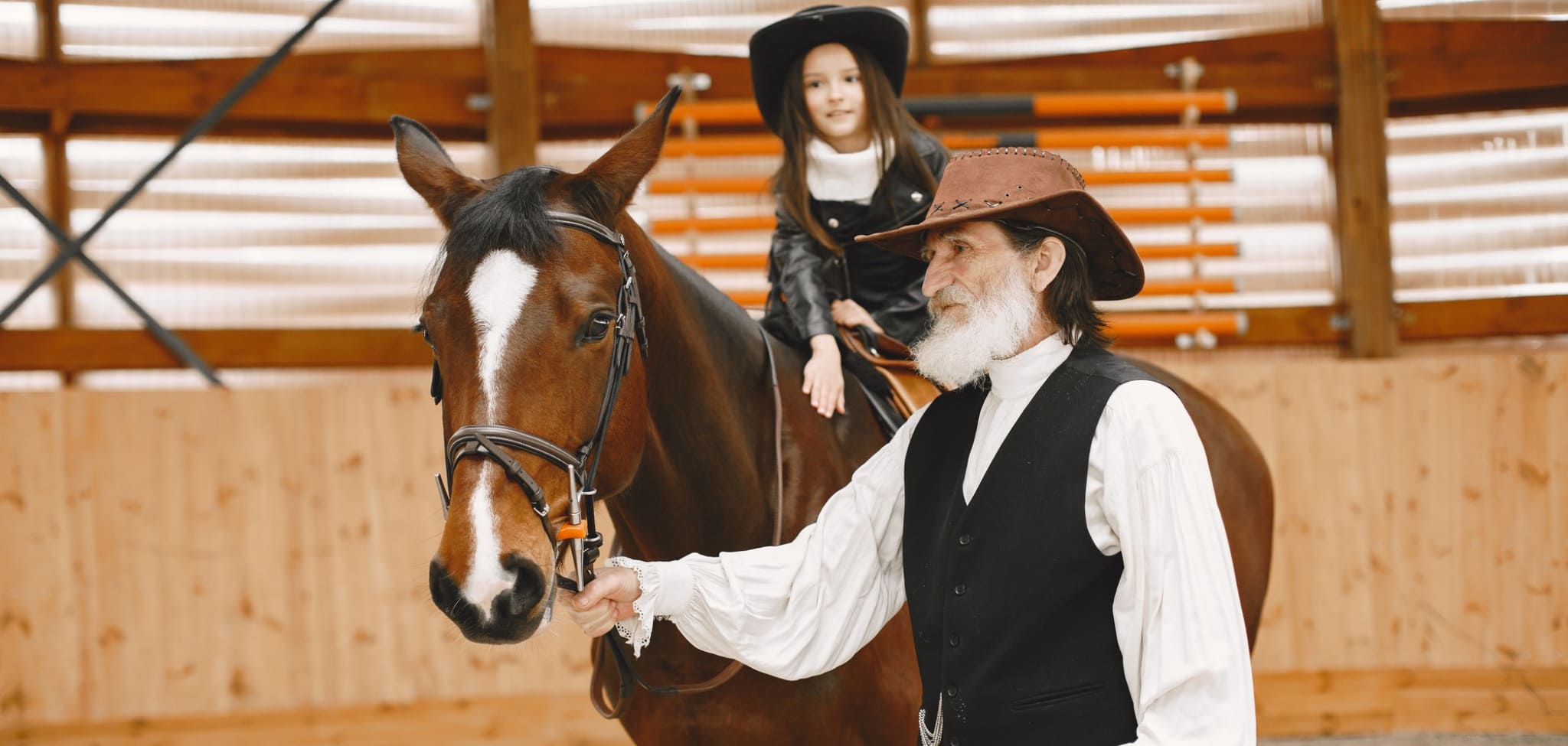The Incredible Benefits of Horseback Riding: Enhancing Physical and Mental Well-being
Horseback riding has been a beloved activity for centuries, evolving from a means of transportation into a popular sport. While many individuals are drawn to riding for the sheer joy it brings, there are numerous physical and mental health benefits associated with this exhilarating activity. From reducing stress and building confidence to improving concentration and boosting self-esteem, horseback riding offers a holistic approach to well-being. In this comprehensive guide, we will explore the remarkable advantages of horseback riding, shedding light on its positive impact on both the body and mind.
Mental Benefits of Horseback Riding
Although horseback riding is renowned for its physical benefits, its positive impact on mental health is equally significant. Engaging in this activity can provide a much-needed respite from the stresses of daily life, offering a range of psychological advantages, including stress reduction, improved confidence, and enhanced problem-solving skills.
1: Stress Reduction
Horseback riding acts as a potent stress reliever due to several factors. First, being in the presence of horses and working with these magnificent animals can create a calming and peaceful environment. Horses are highly sensitive creatures that respond to human energy, making them ideal partners for reducing anxiety and stress. When riding, it is necessary to cultivate a calm and composed presence, which in turn limits the stress signals received by the body, resulting in an overall sense of tranquility and well-being. Additionally, spending time outdoors and connecting with nature has been shown to alleviate stress, boost mood, and promote mental well-being. The exposure to sunlight during outdoor activities also helps combat vitamin D deficiency, which can contribute to mental health issues.
2: Confidence Building
Confidence is a vital component of mental health, and horseback riding provides an excellent platform for its development. When interacting with horses, riders must exude confidence and assertiveness, even when they may not feel it internally. Horses are perceptive animals that respond to their rider’s emotions and body language. By showcasing confident behavior, riders establish themselves as leaders, which not only enhances their relationship with the horse but also fosters self-assurance and resilience. Over time, the cultivation of confidence in the equestrian realm can have a transformative effect, empowering individuals to face challenges and new experiences with greater ease and self-belief.
3: Cognitive Stimulation
Horseback riding offers a continuous learning experience, regardless of one’s level of expertise. The acquisition of new skills and knowledge stimulates the brain, leading to improved concentration, enhanced memory recall, and heightened problem-solving abilities. Engaging in horseback riding exercises the mind, requiring riders to remain alert and responsive to their equine partners. The cognitive demands of riding contribute to increased attention to detail and the ability to adapt to dynamic situations. As individuals age, the continual pursuit of learning becomes even more crucial, as it has been shown to protect against cognitive decline and age-related disorders such as dementia.
Physical Benefits of Horseback Riding
Beyond its mental advantages, horseback riding offers a comprehensive workout that strengthens muscles, improves cardiovascular health, and enhances posture. Engaging in this activity challenges the body in various ways, making it an effective form of exercise for individuals of all ages and fitness levels.
4: Muscle Strengthening

Horseback riding engages a multitude of muscles, particularly those in the core, back, pelvis, and thighs. While riding, the constant need to maintain balance and stability activates the abdominal muscles and the muscles surrounding the spine. A strong core not only improves physical strength but also aids in preventing back injuries and alleviating lower back pain. The effort required to control the horse and maintain proper posture throughout the ride further strengthens the muscles of the lower body. Regular riding sessions can lead to improved muscle tone, increased strength, and enhanced overall physical fitness.
5: Cardiovascular Workout
Contrary to popular belief, horseback riding is not a passive activity but an effective cardiovascular exercise. The physical exertion involved in riding, such as mounting the horse, lifting heavy equipment, and engaging various muscle groups, increases heart rate and stimulates blood circulation. The body’s demand for oxygen and energy during riding leads to improved cardiovascular efficiency. Regular cardiovascular exercise reduces the risk of heart disease by strengthening the heart muscle, enhancing blood flow, and maintaining healthy blood pressure levels. By engaging in horseback riding, individuals can enjoy the dual benefits of an enjoyable equestrian experience while reaping the advantages of a robust cardiovascular workout.
6: Posture Improvement
Maintaining proper posture is crucial for physical well-being, particularly in today’s sedentary lifestyle. Horseback riding can play a pivotal role in cultivating good posture habits. Riders rely on various cues, such as their legs, reins, and seat, to communicate with their horses effectively. Of these cues, the seat provides the most significant contact with the horse’s body. Sitting with proper alignment and an upright posture ensures optimal communication between rider and horse. Slouching or sitting too far forward can disrupt this connection and compromise the rider’s balance and control. By consistently practicing correct posture while riding, individuals develop a habit of maintaining better posture in their everyday lives, leading to improved spinal alignment and reduced strain on the body.
The Unique Bond: Horses as Companions

Apart from the physical and mental benefits discussed above, horseback riding offers a unique opportunity to connect with horses on an emotional level. These magnificent animals possess an innate ability to sense and respond to human emotions, fostering a profound bond between horse and rider. The companionship and unconditional acceptance offered by horses can have a transformative effect on mental well-being, leading to reduced stress, improved socialization, and increased self-esteem.
7: Relaxation and Emotional Connection
Horses have a remarkable ability to induce a sense of calmness and relaxation in humans. As prey animals, they are acutely attuned to their surroundings and possess a natural sensitivity to human behavior. Interacting with horses can be particularly beneficial for individuals with conditions such as anxiety, post-traumatic stress disorder (PTSD), behavioral issues, or sensory problems. Research has shown that equine-assisted therapy can significantly reduce symptoms of anxiety and depression in individuals with PTSD. Horses can mirror and respond to even the slightest changes in a person’s behavior, providing a gentle and soothing presence that promotes emotional well-being. Furthermore, horses have an uncanny knack for detecting shifts in mood, often before individuals are even aware of them. Through regular interaction with horses, riders can develop emotional regulation skills and cultivate a heightened awareness of their own thoughts and feelings, which can be applied to other aspects of their lives.
8: Enhanced Self-Esteem
Horses’ social nature and their reliance on humans for care and companionship can profoundly impact self-esteem. Building a connection with a horse fosters a sense of responsibility and independence, nurturing feelings of confidence and self-worth. Horses are non-judgmental beings that offer unconditional love and acceptance to those who care for them. This acceptance and companionship can create a profound sense of belonging and validation for riders and handlers. Riding a horse and achieving milestones in horsemanship, such as gaining control or learning new riding techniques, can boost self-esteem and empower individuals to believe in their abilities beyond the equestrian realm.
9: Nature’s Embrace
Spending time outdoors and immersing oneself in nature has been shown to have a positive impact on mental health. Horseback riding provides the perfect opportunity to escape the confines of daily life and bask in the beauty of natural surroundings. Whether riding in familiar local areas or embarking on equestrian adventures in new locations, riders can enjoy the benefits of fresh air, natural sunlight, and the serenity of the natural world. The great outdoors offers a myriad of sensory experiences, from the gentle rustling of leaves to the invigorating scent of earth, that can rejuvenate the mind and invigorate the spirit. This communion with nature provides a welcome respite from the demands of the modern world, promoting relaxation, clarity, and a sense of connection to something larger than oneself.
10: Socialization and Empathy
Horseback riding inherently involves socialization, both with the horses themselves and with other individuals who share a passion for equestrian pursuits. This social aspect of riding presents opportunities for improved communication skills, empathy, and the formation of meaningful connections. Joining a riding school or engaging in one-on-one tuition allows riders to meet like-minded individuals, fostering a sense of camaraderie and support. Riding also necessitates an understanding of the horse’s needs and emotions, which enhances empathy and communication skills. Learning to anticipate and respond to the horse’s cues can translate into better interpersonal relationships and improved social interactions outside the equestrian setting.
Conclusion
Horseback riding offers a wealth of physical and mental health benefits, making it a truly holistic activity for individuals seeking overall well-being. By engaging in this exhilarating pursuit, riders can experience stress reduction, improved confidence, enhanced concentration, and strengthened problem-solving skills. The physical demands of horseback riding contribute to muscle strengthening, cardiovascular fitness, and posture improvement. Moreover, the unique bond formed between humans and horses provides emotional support, relaxation, and a sense of companionship. The benefits of horseback riding extend beyond the individual, as riders have the opportunity to connect with nature, foster social connections, and develop empathy. So, whether you are a seasoned equestrian or a novice considering taking up horseback riding, embrace the remarkable advantages it offers and embark on a journey of physical and mental well-being.
“Discover the fascinating journey of equestrian sports through time. Explore the rich history and evolution of this captivating world in our comprehensive article: The History and Evolution of Equestrian Sports.”
LEARN & GROW CORNER
Baseball for Beginners
Baseball for Beginners: A Comprehensive Guide to the Basics Baseball is one of the most popular sports in the United States, enjoyed by millions of people of all ages. It's a game that requires [...]
Collecting Paper Currency
Collecting Paper Currency Hobby: Tips and Tricks for Building a Unique Collection Are you interested in the world of paper currency collecting? If so, you're in for a treat. Collecting paper money is a [...]
Coin Collecting Hobby
Coin Collecting Hobby: A Guide to Starting Your Collection If you've ever found yourself fascinated by the intricate designs and historical significance of coins, you might want to consider starting a coin collecting hobby. [...]
The Stamp Collecting
The Stamp Collecting: A Comprehensive Guide Stamp collecting is a fascinating hobby that has been enjoyed by people all over the world for over a century. Whether you're a seasoned collector or a newcomer [...]
ABC Gardening Hobby
ABC Gardening Hobby: Tips and Tricks for Beginners If you're looking for a rewarding and enjoyable hobby, gardening might be the perfect fit for you. A B C Gardening is a beginner-friendly approach to [...]










